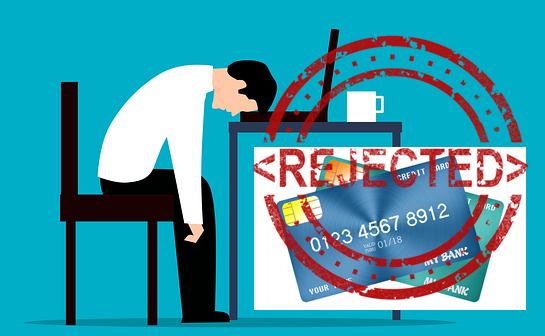Credit Card Denials Explained: Why You Got Rejected and What to Do Next
Getting rejected for a credit card can feel like a personal blow, especially when you thought you had a good chance of approval. Understanding why you were denied and taking the right steps afterward can improve your chances of approval in the future and help you build a stronger financial foundation.
GET CREDIT CARDS APPROVED
Fresh Start Consulting
7/11/20255 min read


Credit Card Denials Explained: Why You Got Rejected and What to Do Next
Getting rejected for a credit card can feel like a personal blow, especially when you thought you had a good chance of approval. The good news is that credit card denials are more common than you might think, and they're rarely permanent roadblocks. Understanding why you were denied and taking the right steps afterward can improve your chances of approval in the future and help you build a stronger financial foundation.
Your goal is to rapidly resolve your financial challenges using the right ‘Credit Repair’ solutions. You can do this yourself, which can be challenging, or work with a qualified professional Credit Repair Consulting service like FreshStartConsult.com. The following information will give you a great overview of the process.
Understanding the Credit Card Application Process
When you apply for a credit card, the issuer evaluates your creditworthiness using a combination of factors. They're essentially asking themselves: "Will this person pay back what they borrow?" This evaluation happens quickly, often within minutes, but it's based on comprehensive data about your financial history and current situation.
Credit card companies use automated systems that analyze your credit report, income, existing debt, and other factors against their specific lending criteria. Each issuer has different standards, which explains why you might be approved by one company and denied by another on the same day.
Common Reasons for Credit Card Denials
Poor Credit History or Low Credit Score
Your credit score is often the most significant factor in the approval process. Most major credit cards require a score of at least 600-650, while premium cards may require scores of 700 or higher. If your score falls below the issuer's threshold, you'll likely face denial.
Credit score issues often stem from late payments, high credit utilization, accounts in collections, or bankruptcy. Even if your score has improved recently, negative marks can remain on your credit report for several years.
High Credit Utilization
Credit utilization represents how much of your available credit you're using. If you're using more than 30% of your available credit limits across all cards, it signals to lenders that you might be overextended financially. High utilization can lead to denial even if you have a decent credit score.
Insufficient Income
Credit card issuers need to verify that you have enough income to handle additional debt responsibly. If your stated income seems too low relative to your existing obligations, or if you can't provide adequate proof of income, you may be denied.
Too Many Recent Credit Inquiries
When you apply for credit, the lender performs a "hard inquiry" on your credit report, which temporarily lowers your credit score. Multiple recent inquiries can be a red flag, suggesting you're desperately seeking credit or taking on too much debt too quickly.
Limited Credit History
Paradoxically, having no credit history can be just as problematic as having bad credit. Without a track record of managing credit responsibly, lenders can't assess your risk level. This is particularly common among young adults and immigrants who haven't had time to build credit in the United States.
Existing Relationship Issues
If you have a negative history with the specific credit card issuer, such as a previous default or closed account, they may deny your application regardless of your current financial situation. Some companies maintain internal databases of customers they prefer not to work with again.
Errors on Your Credit Report
Mistakes on your credit report can unfairly impact your creditworthiness. These might include accounts that don't belong to you, incorrect payment histories, or outdated information that should have been removed.
What to Do Immediately After a Denial
Request the Denial Letter
Federal law requires credit card issuers to provide a written explanation for denials. This letter, called an adverse action notice, must arrive within 30 days of your application. It will list the specific reasons for denial and provide information about your credit score and which credit bureau was used.
Check Your Credit Report
You're entitled to a free credit report from each of the three major credit bureaus (Experian, Equifax, and TransUnion) annually through annualcreditreport.com. After a denial, you can also request a free report from the bureau the issuer used. Review your report carefully for errors or areas that need improvement.
Don't Apply Again Immediately
It's tempting to apply for another card right away, but this strategy usually backfires. Each application generates a hard inquiry, and multiple inquiries in a short period can further damage your credit score. Instead, take time to understand and address the reasons for your denial.
Steps to Improve Your Chances for Future Approvals
Focus on Your Credit Score
If your credit score was the primary issue, concentrate on improving it before applying again. Pay all bills on time, reduce credit card balances, and avoid closing old credit accounts. Consider becoming an authorized user on someone else's account if they have good credit habits.
Lower Your Credit Utilization
Aim to keep your credit utilization below 30% on individual cards and across all accounts. If possible, pay down balances or request credit limit increases on existing cards. Some people benefit from making multiple payments per month to keep reported balances low.
Address Credit Report Errors
If you find errors on your credit report, dispute them immediately with the credit bureau. Provide documentation supporting your claim, and follow up to ensure the corrections are made. This process can take 30-45 days but may significantly improve your credit standing.
Build Credit History
If you have limited credit history, consider options like secured credit cards, credit-builder loans, or becoming an authorized user on a family member's account. These tools can help establish a positive credit history over time.
Wait Before Reapplying
Generally, wait at least three to six months before applying for another credit card, especially with the same issuer. Use this time to improve your credit profile and address the specific reasons for your denial.
Alternative Options to Consider
Secured Credit Cards
Secured cards require a cash deposit that serves as your credit limit. They're easier to qualify for and can help build or rebuild credit when used responsibly. Many secured cards eventually offer the option to convert to unsecured cards.
Store Credit Cards
Retail store cards often have more lenient approval criteria than major credit cards. While they typically have higher interest rates and limited usage, they can be a stepping stone to building credit.
Credit Union Cards
Credit unions are member-owned financial institutions that often have more flexible lending criteria. If you're eligible to join a credit union, their credit cards might be more accessible than those from major banks.
When to Seek Professional Help
If you're struggling to understand your credit situation or having difficulty improving your credit score, consider consulting with a reputable credit counselor. Non-profit credit counseling agencies can provide personalized advice and help you create a plan to improve your financial health.
Moving Forward
A credit card denial isn't the end of your financial journey. It's an opportunity to better understand your credit profile and take steps to improve it. By addressing the specific reasons for your denial and being strategic about future applications, you can increase your chances of approval and build a stronger financial foundation.
Remember that building good credit takes time and patience. Focus on developing healthy financial habits, such as paying bills on time, keeping balances low, and only applying for credit when you truly need it. With consistent effort and smart financial decisions, you'll be well-positioned for future credit card approvals and other financial opportunities.
The key is to view this setback as a learning experience rather than a permanent barrier. Your financial future remains in your hands, and taking proactive steps today will pay dividends tomorrow.
There is a more reliable way to improve your credit score. Choose an expert Credit Repair company to dramatically speed up the process and get results faster. FreshStartConsult.com offers a FREE consultation call to help you understand your options. Fresh Start has thousands of happy clients and great reviews. Best of all, you can use our ‘Express Service’ for even faster results.
CONTACT INFO
Address
Bringing People Hope
Email to find out how it works!
info@freshstartconsult.com
FRESH Start Consulting
100 Matawan Road
Matawan, NJ 07747
Suite 325 #1129
